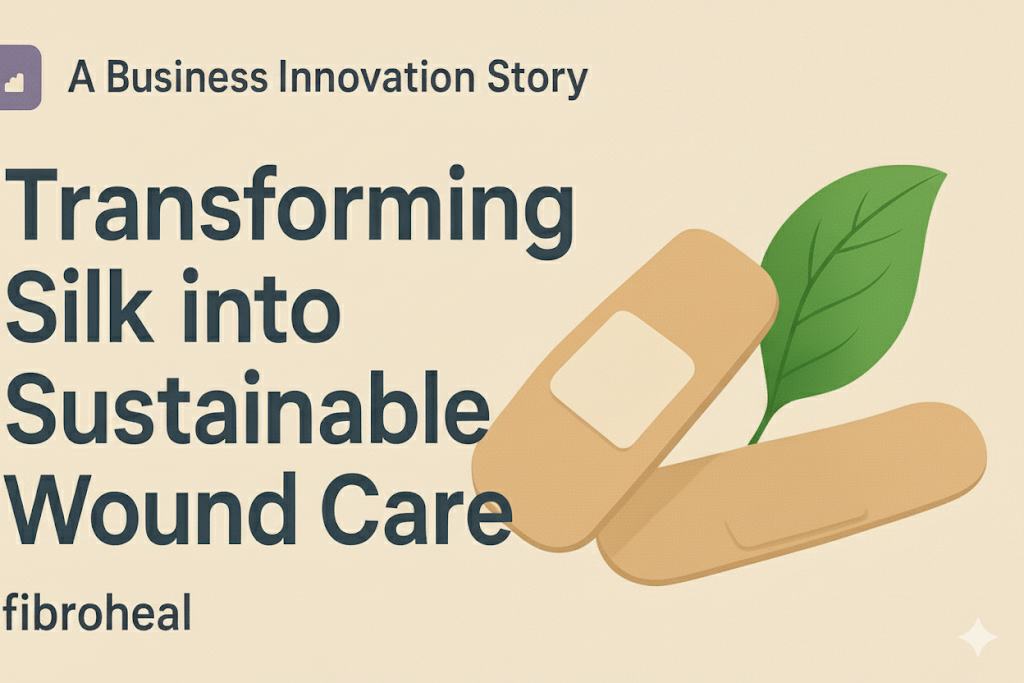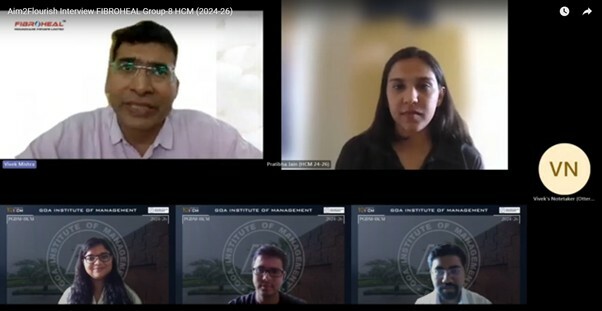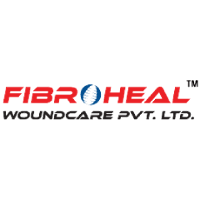


Keep this story going! Share below!
Fibroheal is pioneering the use of silk proteins as a biomaterial for advanced wound care, creating sustainable alternatives to conventional synthetic products. This innovation not only accelerates healing for acute and chronic wounds but also promotes responsible resource use and circular economy practices. By aligning science with purpose, Fibroheal directly advances SDG 3 (Good Health and Well-Being), SDG 9 (Industry, Innovation & Infrastructure), and SDG 12 (Responsible Consumption & Production).
What if the delicate silk thread, long celebrated as a symbol of elegance, could instead become a tool for saving lives? That is exactly what Fibroheal has achieved. Founded in 2017 in Bengaluru, India, the company has reimagined silk proteins as a biomedical material for advanced wound care, making it one of the few organizations globally to explore silk beyond textiles. This shift reflects a bold commitment to science-driven sustainability, where a natural resource is transformed into an innovative healthcare solution.
Fibroheal develops wound care products that accelerate healing for acute, chronic, and difficult-to-heal wounds. The company’s proprietary, IP-protected technology extracts and processes silk proteins to create dressings and biomaterials that are biocompatible, affordable, and highly effective. Unlike many synthetic wound management products, silk-based solutions are eco-friendly and sourced responsibly, ensuring that innovation does not come at the cost of the planet. Manufactured in an ISO 13485 and GMP-certified facility, these products meet stringent international standards, making them suitable for both institutional and consumer healthcare markets.
This innovation is more than a scientific achievement—it is a purposeful response to some of the world’s most pressing challenges. By offering sustainable wound care alternatives, Fibroheal addresses SDG 3 (Good Health and Well-Being) by improving patient outcomes, SDG 12 (Responsible Consumption and Production) by reusing natural resources, and SDG 9 (Industry, Innovation, and Infrastructure) by advancing biotech-driven healthcare solutions. In doing so, Fibroheal demonstrates how a business can thrive at the intersection of health, sustainability, and social impact, weaving together a future where science heals both people and the planet.

For Vivek Mishra, the driving force behind Fibroheal was never about chasing financial success, but about aligning passion, purpose, and impact. In his conversation with us, he repeatedly emphasized that careers and businesses built only for money are unsustainable in the long run. Instead, he believes that meaningful innovation emerges from staying true to one’s strengths and values.
He reflected on this philosophy when advising students: “Look at your area of interest. What do you like? What is your strength? What excites you?” He explained that many professionals feel pressured to enter fields that may not suit their talents, but that real success lies in following one’s passion and allowing impact to guide the journey. This personal belief shaped his decision to invest years of research and effort into developing silk protein–based wound care products—an unconventional path, but one deeply aligned with both science and sustainability.
To illustrate his perspective, Mr. Mishra drew upon Indian mythology, comparing wealth (Lakshmi) and action (Vishnu). “Lakshmi will always be there when there is karma, when there is action,” he said, reminding us that money naturally follows when purposeful action leads the way. For him, Fibroheal represents that action—a commitment to solving real-world health challenges while respecting natural resources.
Thus, the inspiration behind Fibroheal was more than a scientific opportunity; it was a calling to blend innovation with responsibility. Mr. Mishra’s leadership embodies the belief that when work is rooted in passion and action, it not only creates successful businesses but also leaves a lasting impact on society and the planet.
The impact of Fibroheal’s innovation can be seen on multiple levels—medical, social, and environmental. At its core, the company provides life-changing wound care solutions for patients suffering from acute, chronic, and hard-to-heal wounds. In the short term, this translates into faster recovery times, reduced risk of infection, and more affordable care options, especially in settings where access to advanced healthcare is limited. By designing products that are both effective and accessible, Fibroheal ensures that healing is not a privilege but a possibility for all.
The innovation also creates ripple effects beyond the hospital or clinic. Fibroheal’s reliance on silk proteins promotes a circular economy model, ensuring that natural resources are used responsibly and sustainably. This directly supports sericulture farmers, who now find additional livelihood opportunities as silk is repurposed for biomedical use. In the long run, this strengthens rural economies while positioning India as a leader in bio-based healthcare innovation.
From an evidence standpoint, the company’s ISO 13485 and GMP-certified facility ensures that every product meets rigorous global standards, enabling trust among healthcare professionals. Its proprietary IP-backed technology further underscores its credibility as a pioneer in silk-based wound management. Over time, the broader impact is twofold: advancing SDG 3 (Good Health and Well-Being) by improving patient outcomes, and driving SDG 12 (Responsible Consumption and Production) by reducing waste and promoting sustainable resource use.
Ultimately, Fibroheal’s work proves that innovation can simultaneously heal patients, empower communities, and preserve the environment—creating a holistic impact that extends well beyond immediate healthcare outcomes.
Because Fibroheal chose to focus on silk proteins as a biomaterial for wound care, the company has established a unique competitive advantage in the healthcare market. Few players globally are working on non-textile applications of silk, which makes Fibroheal a pioneer in its field. This differentiation has opened doors to collaborations with hospitals, research institutions, and healthcare professionals who are eager for sustainable alternatives to synthetic wound care products.
By innovating in this niche, the company has also created opportunities for market expansion. Fibroheal’s products are designed to serve both institutional healthcare providers and individual consumers, giving the business access to a wide customer base. Its certified manufacturing facility and IP-protected technology further strengthen its credibility, positioning the company for future international growth. Because the business aligned its model with global sustainability goals, it has also become more attractive to impact investors and partners looking to support ventures that combine profitability with purpose.
Internally, the innovation has also fostered a culture of research and responsibility. Fibroheal’s dedicated in-house R&D team continues to develop new applications of silk proteins, ensuring a pipeline of innovative products that can sustain long-term growth. This focus on purpose-driven innovation has helped the business build not just a portfolio of advanced wound care solutions, but also a reputation as a leader in sustainable healthcare. In the long run, this positions Fibroheal not only as a successful biotech start-up but also as a role model for businesses seeking to balance profit with positive impact.
Fibroheal’s silk-based wound care products provide tangible social benefits by improving the quality of healthcare and making advanced treatment more accessible. Patients suffering from slow-healing or chronic wounds often face prolonged pain, infection risks, and high medical costs. By introducing affordable, effective, and biocompatible alternatives, Fibroheal helps reduce this burden, enabling patients to recover faster and regain their livelihoods. Hospitals and healthcare providers also benefit from reduced treatment times and lower complications, creating a positive ripple effect across the healthcare ecosystem.
The innovation also benefits the environment by repurposing silk—traditionally used in textiles—into a high-value biomedical resource. This approach reduces reliance on synthetic materials, many of which are petroleum-based and environmentally taxing to produce. By creating a circular model where natural proteins are transformed into life-saving medical solutions, Fibroheal contributes to more sustainable production and consumption patterns, aligning directly with SDG 12. In addition, the company’s work supports sericulture farmers by creating new non-textile demand for silk, strengthening rural livelihoods and fostering inclusive growth.
On a broader scale, Fibroheal demonstrates how businesses can align profitability with sustainability. Its research-driven model contributes to SDG 3 (Good Health and Well-Being) by enhancing patient care, SDG 9 (Industry, Innovation and Infrastructure) by advancing biotech applications, and SDG 15 (Life on Land) by promoting responsible resource use. Through its dual focus on human health and environmental stewardship, Fibroheal shows that true innovation is not just about solving problems today, but about shaping a healthier, more sustainable tomorrow.
Get stories of positive business innovations from around the world delivered right to your inbox.
Vivek Mishra, Director & CEO


Fibroheal is transforming silk into life-saving wound care solutions that are sustainable, affordable, and accessible. By blending biotechnology with purpose, the company is healing patients, empowering communities, and advancing global goals for health and responsible innovation. With a strong foundation in research and development, Fibroheal demonstrates how science can be harnessed to address real-world medical challenges. Its work reflects a vision where business growth goes hand in hand with social good and environmental responsibility, contributing directly to SDG 3 (Good Health and Well-Being), SDG 9 (Industry, Innovation and Infrastructure), and SDG 12 (Responsible Consumption and Production).